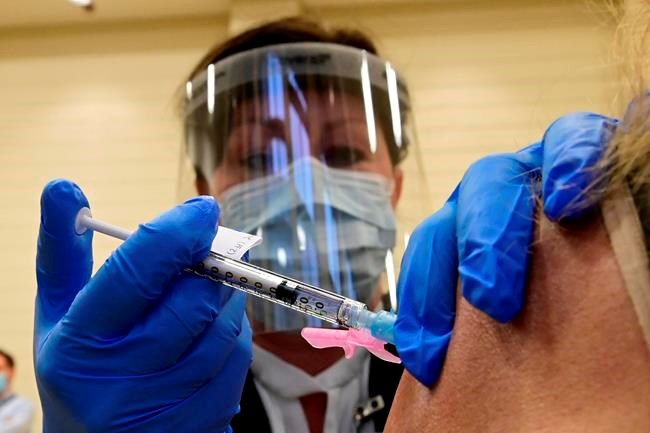Thousands of Alberta seniors rushed to book their COVID-19 vaccines on Wednesday, with some reporting difficulties securing a spot, as Ontario laid out its own plan for immunizing older residents.
More than 12,000 Albertans born in 1946 or earlier succeeded in booking their shots on the first day reservations became available in the province, according to Alberta Health Services, though several on social media reported problems accessing a booking website and the provincial 811 Health Link line.
The provincial health agency said more staff were brought in to manage the surge in calls to 811, but Alberta's top public health doctor has advised people to be patient, noting there are 230,000 people in the eligible age group.
Ontario announced a similar booking system for those 80 and older would be made available on March 15, with younger seniors able to reserve their spots in the weeks and months after. Health officials stressed, however, that the timeline largely depends on the province's supply of vaccines.
The head of the province's vaccination task force, retired Gen. Rick Hiller, said those 75 and older should start getting immunized mid-April, and those 70 and older at the start of May. Ontarians 65 and over will be next in June, and those 60 and older will start getting shots the following month.
Meanwhile, the National Association of Friendship Centres called on Ottawa to co-ordinate a vaccine rollout for Indigenous people living in urban communities, as it is doing in collaboration with First Nations and Inuit governments for those on reserves.
The organization's executive director, Jocelyn Formsma, called on the federal government to consider doling out doses to clinics serving Indigenous people in urban areas, rather than waiting for the provinces to do it. She said more than 50 clinics run by her organization could administer the shots.
But Indigenous Services Minister Marc Miller said the distribution of vaccines to Indigenous people outside of reserves will be faster and more efficient if done through the provinces.
At the same time, active cases of the virus in First Nations communities are going down across Canada, the minister said. He reported 1,443 active cases on reserves as of Tuesday, adding vaccinations have begun in 440 Indigenous communities.
Surging cases prompted officials in the Nunavut community of Arviat to declare a state of emergency Wednesday, and impose a curfew from 10 p.m. to 6 p.m. effective immediately.
There are currently 27 active cases in the community of about 2,800 people, which was previously the centre of Nunavut's largest COVID-19 outbreak.
Ontario reported 1,054 cases of COVID-19 and nine more deaths related to the virus Wednesday. Quebec, the other province hardest-hit by the pandemic, logged 806 new infections and 17 more deaths.
This report by The Canadian Press was first published Feb. 24, 2021.
Paola Loriggio, The Canadian Press




